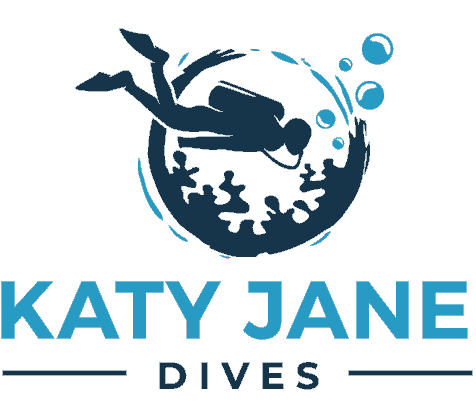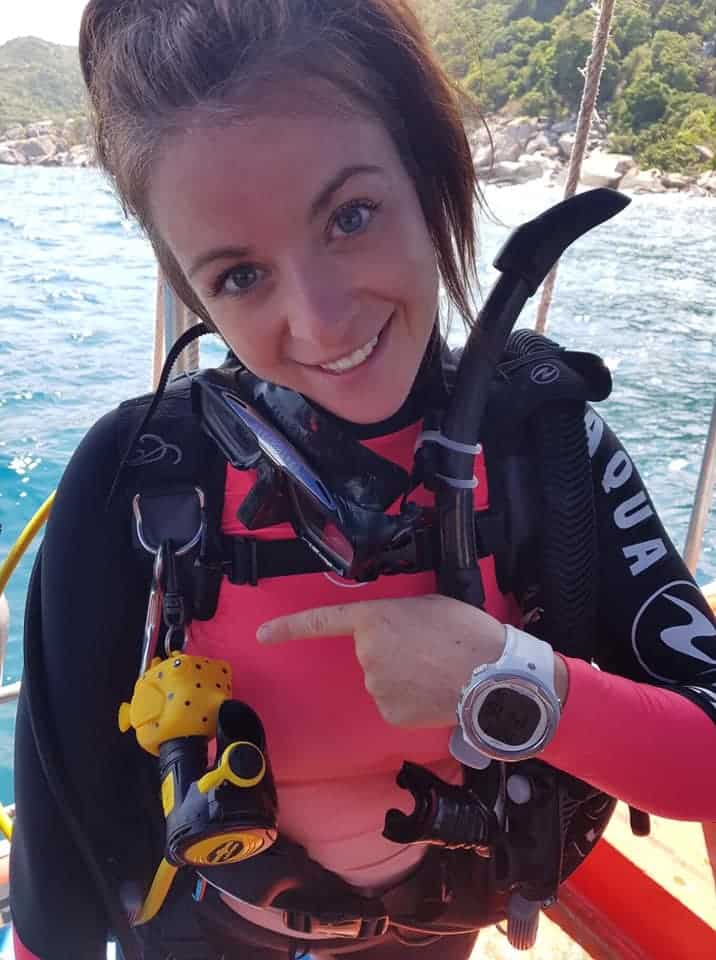Despite the two sports looking seeming similar from a distance, many scuba divers would easily tell you there are lots of distinct differences between snorkeling and scuba diving.
Snorkeling only requires a mask and snorkel and is based at the surface of the water whereas scuba divers descend beneath the surface and can reach incredible depths using breathing apparatus.
Table of Contents
What is the Difference Between Snorkelling and Scuba Diving?
Read on for some of the most basic differences between scuba diving and snorkeling.
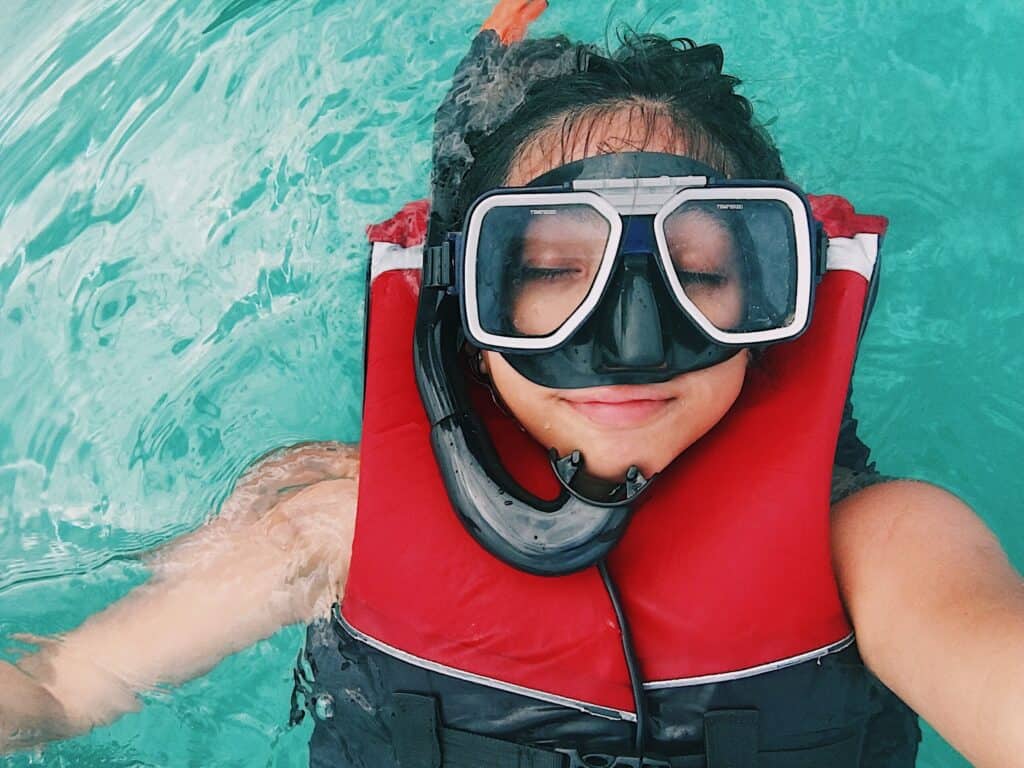
- Snorkeling only requires a mask and snorkel
- Snorkeling takes place on the surface of the water
- Snorkeling is an inexpensive sport
- There are no official snorkel qualifications required
- Breathe through the snorkel
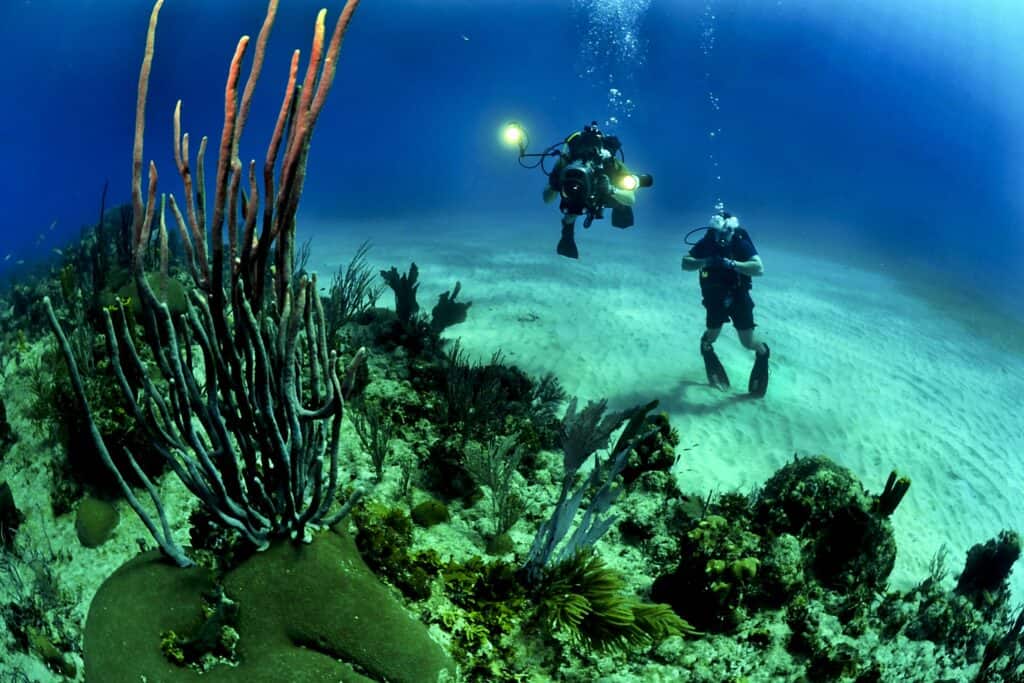
- Scuba diving requires lots of underwater breathing apparatus
- Scuba diving takes place underwater and can reach depths of 130 ft
- Scuba requires lots of equipment, making it an expensive sport
- Breathing underwater counts on the tank on your bank and regulator
Okay, But There Must Be Similarities?
There are big differences between the two sports but they both attract similar hobbyists and like-minded individuals.
Many divers also enjoy snorkeling when they’re not diving and there are times when snorkeling trumps scuba diving due to conditions and the chance to spot marine life that will otherwise scatter if you get too close.
Here are some of the similarities between the two:
- Both take place in the ocean
- Sports used to explore marine life
- Can be enjoyed in cold or hotter climates
Snorkeling vs Scuba Diving
Now that I’ve run through the basics with you, it’s worth looking at each of these points in a bit more detail.
For snorkelling, you only need a mask and a snorkel
Scuba diving requires much more in the way of specialist equipment. For example, to scuba dive, you will normally need a diving suit, a diving mask, tank, regulators, fins and a bouyancy control device (BCD). Check out the buying scuba gear guide here for the bare essentials.
To snorkel, you will generally only need a mask and a snorkel. You can wear fins, too, and it’s probably recommended if you are going to be snorkeling for long periods, or if you’d like to travel long distances efficiently. You will be able to use the top scuba fins to aid your snorkel trip.
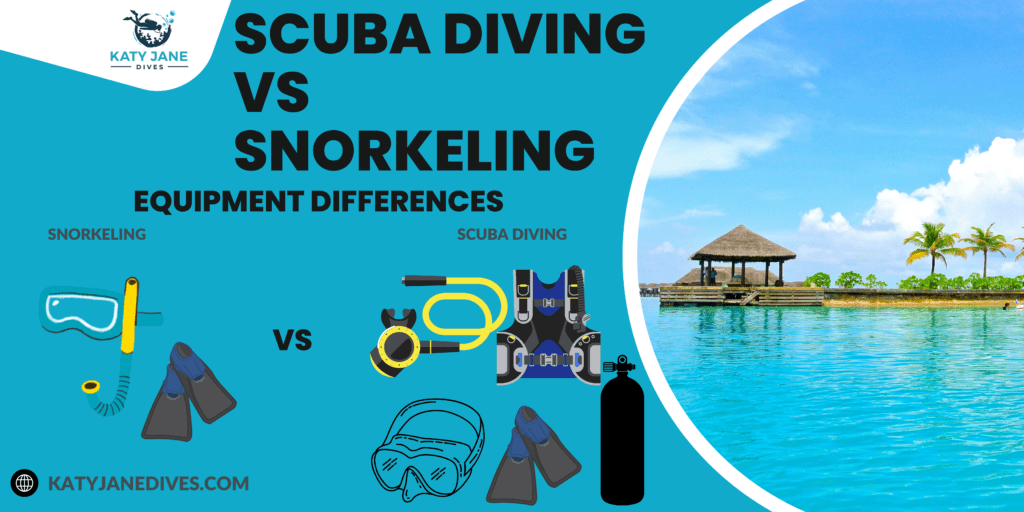
To dive, you'll need to be qualified, or need instructor support in the water
Any scuba diver will tell you that scuba diving requires a qualification in one form or another, such as the PADI Open Water Certification. This is because you are going to need to know what to do when using your equipment deep down in the water – your equipment is your life support system – and scuba diving, as you can imagine, carries its own set of risks.
What’s more, it’s normally safer to go scuba diving in a group. There is safety in numbers, and both snorkelling and diving should be done in at least with another person.
Snorkeling is generally less risky as far as going solo is concerned. While a scuba dive can require backup and guidance from instructors, you can head into snorkeling without any kind of training. However, it’s worthwhile learning how to control your breathing if you do want to dive below the water.
To dive, you go deep - and to snorkel, you stay at the surface
As mentioned, the key difference between snorkeling and scuba diving is the fact that one is deeper than the other! When considering snorkeling vs scuba diving, you need to consider whether you want to stay up at the surface (snorkeling), or dive down deeper into the water and beneath the surface (scuba diving).
The choice is yours. Many people prefer getting into scuba diving as they generally get to see more marine life. There’s also the fact that scuba diving creates a feeling of weightlessness which is, trust me, mind blowingly amazing! However, snorkeling / diving both give you a great chance to see coral, and to generally enjoy the wide open water.
If you’re not comfortable with going into deeper diving right away, it may be best to start with snorkeling, and to work your way deeper into the water. As mentioned, you’ll need training of some kind to really explore the deep.
Some people enjoy freediving – a sport that sees people retain their breath for several minutes whilst diving down to depths and returning to the surface for a breath of air. Again, this is another practice that I would recommend training for and the PADI Freediver course is a good place to start.
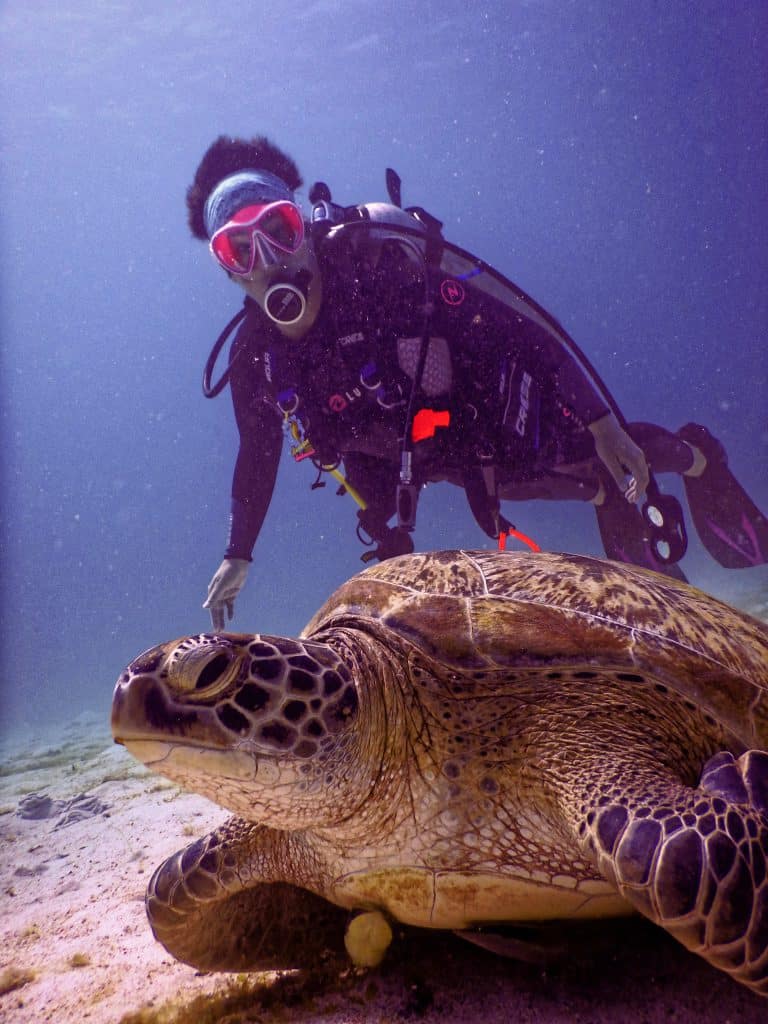
Breathing techniques differ
This is where things can get a little more technical. The way you breathe differs between snorkeling and scuba diving, meaning that you are going to need to learn a handful of techniques if you intend to try either at any point.
With snorkeling, you will often need to duck back up to the surface to expel water. It’s a safe way to make sure you always have air. However, if you do want to go on a deeper snorkeling dive, there are techniques you can use to make your breath travel that little bit further. You will, however, always need to hold your breath.
With scuba diving, you should NEVER hold your breath, but will keep breathing air supplied by a tank. You’re completely submerged and have a diving mask and regulator. You can use this to safely breathe under the water.
Both snorkeling and scuba diving carry individual dangers
No matter how you get into the water, there are always going to be dangers.
Prolonged scuba diving using the wrong equipment or techniques is most likely to end with problems. There is also the fact that you might succumb to decompression sickness if you do not keep a close eye on your dive limits. This is why it is always important to train and get qualified so that you become a competent scuba diver.
As mentioned, it is also important to have a few people go diving with you.. The more people you have around you, the safer you will be if anything goes wrong. I wouldn’t recommend you go exploring a dive site with one big group of 30 divers, but you know what I mean!
Snorkeling carries very different risks. In this case, you might run the risk of running into boats of crafts if they are unable to spot you. In severe cases, you may even find that you are at risk of sunburn or dehydration, or even drifting far away from your group or boat with the current. Therefore, as always, it is crucial that you prepare before you snorkel, and that you know remain aware of your surroundings and environmental conditions. Remember that these could change quickly.
Snorkelling Meaning - What is Snorkeling?
Snorkeling means to swim through water with a mask and a snorkel, which is a tube that allows you to breath with your face in the water and expel water when you reach the surface.
However, if your snorkel goes below the water, you will need to hold your breath. This is because water will be entering the tube.
When considering this snorkeling meaning, do also keep in mind that there are different masks and pieces of equipment out there, as well as a few different twists on the pastime. It’s worth taking a look online if you’re considering snorkeling vs scuba diving, and are considering the best option to take!
Recommended: How to Snorkel Underwater
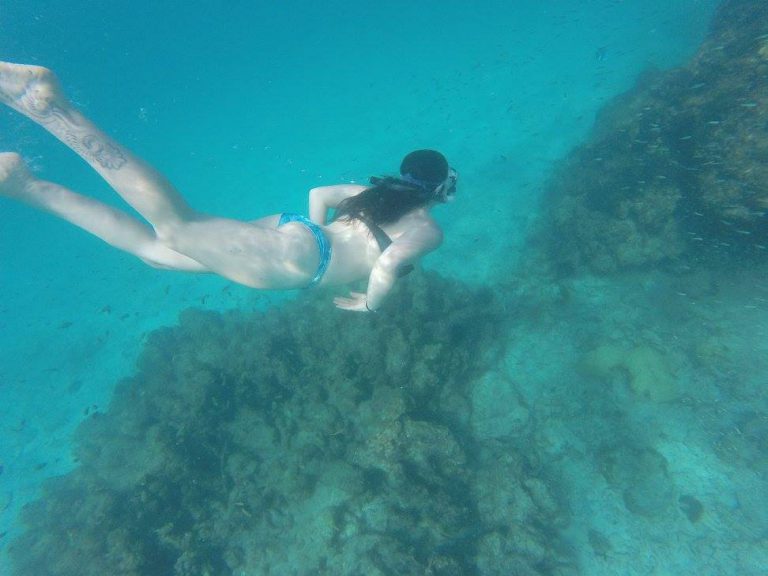
Snorkeling and Scuba Diving Pros & Cons
The difference between snorkeling and scuba diving should now be pretty clear, but which is likely to be best for you?
Snorkeling is great fun and very easy to get into. It needs no training beyond breathing control. However, you don’t get to see as much of the ocean as you do through scuba diving, and what’s more, you won’t achieve that awesome weightlessness feeling. Visibility might not be as good, either!
Scuba diving is actually a very different type of pursuit. Its main benefits are that you get to dive down to various depths, and you will likely get to spot all kinds of creatures and critters. However, unlike snorkeling, it’s takes a lot more training and experience from qualified instructors.
You could always consider taking the PADI Discover Scuba Diving course which allows you to experience all that Scuba has to offer after a quick classroom session and under very close supervision from an Instructor.
Therefore, both pastimes carry different pros and cons, and are both great ways of exploring the deep. It may be worth starting out with snorkeling to see how you get on, but do remember than even simple snorkeling trips carry risks.
As always, do plenty of reading, make sure you have the right training, and stock up on the right equipment. If I have sparked an interest in you to try scuba diving, why not find out what beginners should know about scuba diving. You’ll be having fun in the deep before long!
